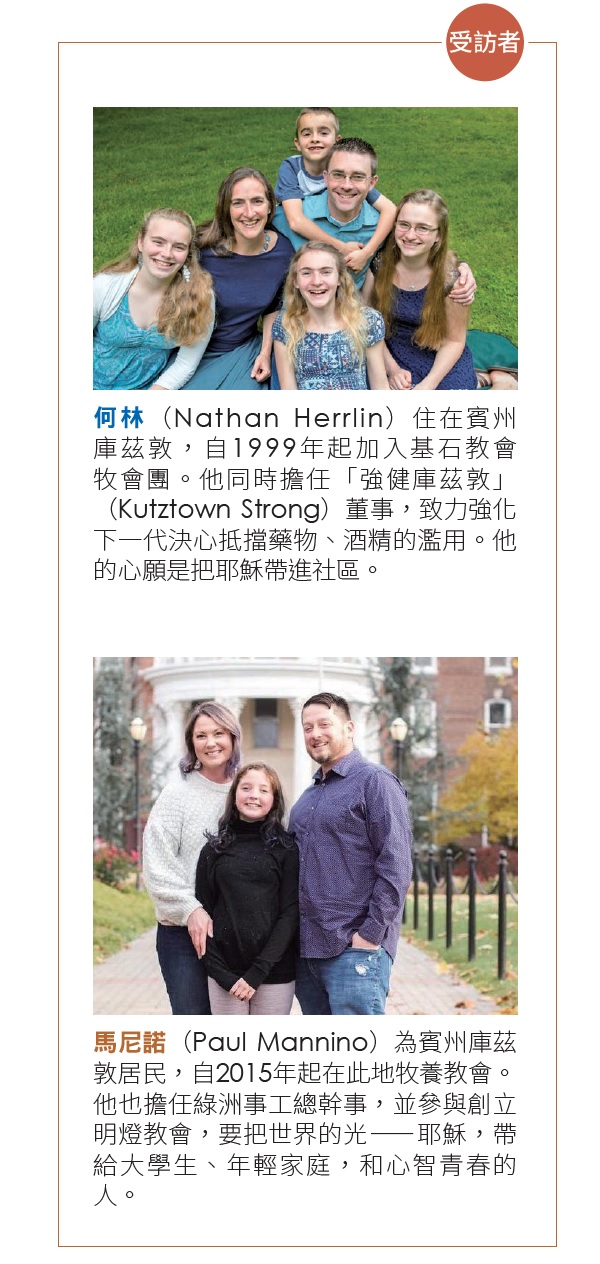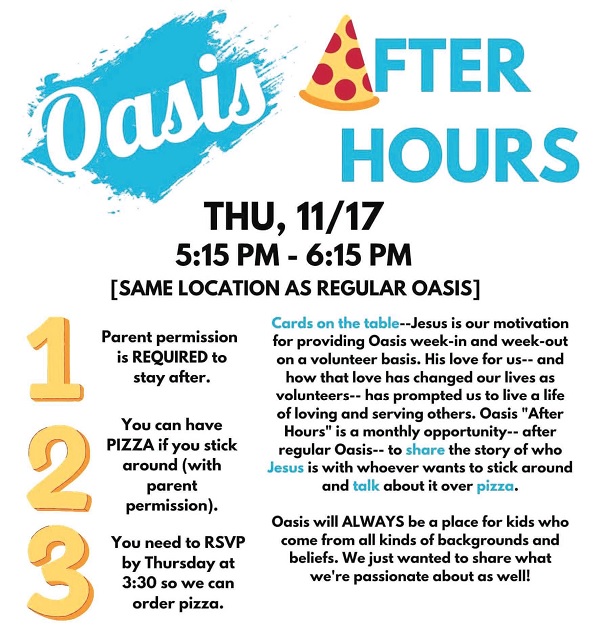When church and community join forces
Translated by Lin Yu
Evidence from Kutztown Oasis’ tutoring ministry in Pennsylvania, USA
When a church is planning, has it ever stalled because it was stuck in its own ideals and assumptions?
I remember when I contacted nearby churches for college campus ministry and invited their support, I heard responses similar to the following: “Gee, we wanted to do this and that for the students at that school, but they weren’t interested.” Unfortunately, The student ministry at that church stopped there.
Churches assume that they can just add one more ministry to this or that group of people without leaving the boardroom. Yet churches really need to avoid falling into this pattern in order to function healthily.
The subjects of this interview with Project Arctos (our English ministry) are the local churches who have gone beyond the four walls and cooperated with the community in their ministry visions and plans, demonstrating the power and effectiveness of working together.
Oasis [1] is an after-school tutoring ministry in Kutztown, Pennsylvania, USA. Pastor Nathan Herrlin of Cornerstone Community Church is the key to the formation of the ministry; Pastor Paul Mannino of Beacon Church leads the daily operations of the ministry.
I hope that through their sharing, you and I can see what God is doing in the church; I pray that this report will inspire more Christians to build bridges between the church and the community, organize similar ministries, and bless the people of the community through partnership.

community's urgent needs
Background: The opioid abuse (opioid) crisis has hit teenagers in the Kutztown community hard. National Public Radio (NPR) reported [2] that these drugs have invaded areas that were least likely to have such a problem. Sadly, more and more students in the Kutztown area are falling into the black hole of substance abuse, so much so that six students died from heroin overdoses in two years. Let me emphasize: opening a dialogue with community leaders is a critical step. This does take time away from the pastor’s time dealing with the internal needs of the church, but it is believed that serving the community is part of the overall ministry of the church.
Project Arctos: What prompted the formation of Oasis Ministries?
He Lin:In 2014, the pastor of Cornerstone Church invited community leaders to lunch to get their input on how a nonprofit like our church could serve the specific needs of the community. The answer that day was resounding and unanimous: after-school activities for teenage students.
A few weeks later, the local school district held a town meeting to discuss the opioid abuse crisis. One of the requests raised at the meeting was the establishment of a youth center. We see this as confirmation that serving young people is on the right track. That spring, we conducted a two-week experiment in the community library; at the beginning of the new school year, Oasis was born. It has grown since then.
Project Arctos: How to get support from the community? What results were obtained? What future developments have there been in this support?
He Lin:The community library allows us to use the conference room for free; the school district allows us to promote Oasis' services at school through flyers, daily radio broadcasts, emails, and parent meetings. At the beginning of the school year, the middle school principal also personally escorted a group of students to the Oasis to join in the activities and help them feel more comfortable during their first few days.
Because when the timing is right, we can get strong support from the school district and the community. After several years of operation, the trust of the community and parents in us has also increased.
Two years after the ministry started, we had enough funds to rent space from a neighboring church to make it more convenient for students. We felt it would be better to use a non-ecclesiastical, neutral location during the founding of Oasis. After it has established a certain scale, the church will be used as the venue for the activities, and the obstacles will be smaller.
Manino: I agree with that. There was less resistance to Oasis using a nearby church as a venue because they had built up "street credibility" in the school system and the community over the years. Today, we have a team of volunteers from five local churches, and we have another church supporting the ministry financially, which is so cool! This is really the power of the team!
In my past life as a youth pastor, I also tried to build strong connections with school districts. From my experience, it is a miracle that Oasis can get such positive support from these schools. It was when the superintendent and I were handing out fliers side by side at the sixth grade orientation that I began to realize how unusual this school/church relationship was.

Children can feel safe here
Project Arctos: What are the daily and weekly activities at Oasis?
He Lin:The Oasis is targeted at students in grades 6-12. Elementary and high school students are welcome to come here to chat, play games, do homework, or talk to adults who care about them. The same volunteers come here every week, so we can build trust with the students, and the students are willing to share their lives and experiences with us. Occasionally we talk about spiritual topics, but not every day. Starting from 2022, we will hold "Oasis After Hours" once a month, hoping to have more direct faith teaching and dialogue.
Project Arctos: Please share a few impressive stories. How is God working through this ministry?
He Lin:For me, the greatest achievement is that the church serves the community in a very practical way, and the community sees value in the service we provide.
Oasis has been going on for several years, and I met a group of tenth grade boys who were only sixth graders when they first came to Oasis. They still like to come to Oasis now. The relationships and trust we built are priceless.
Most students who come to Oasis would not call themselves followers of Christ; most students have no connection with the church. Therefore, the volunteers can talk to them about spiritual topics that they cannot get anywhere else. When students lose their parents, we grieve with them; we also become a stable and caring place when students' parents divorce, accompanying them through the chaotic period after the breakdown of family relationships.
Manino:It's really exciting to meet this group of tenth-grade boys who are die-hard fans. But it’s equally inspiring to think about the impact it could have on a new group of sixth-graders. I know that the pastors who come to volunteer have established good relationships with the children, which even extends beyond the normally scheduled activity time. We started seeing students come to church. I had arranged to go out for burgers with a young boy who had just arrived at Oasis, at the request of his mother to talk to him about his baptism.
Project Arctos: What is the need for ministry? What challenges did you encounter?
He Lin:It is still a challenge for us to build a bridge between the casual and fun environment of Oasis and the spiritual dialogue. We really want these students to find spiritual stability and healing from Jesus.
Manino:We need more volunteers to interact with students when they come to Oasis. This is a big challenge.
(The original text was published in the 68th issue of the English unit,The Church as Community Partner: The Oasis After School Ministry in Kutztown, PA. )
Reflections on the interview
• Cooperation with the community: Judging from the current environment, it is difficult to imagine that the church can get trust and support from schools or other community organizations, because they are always worried that the purpose of the church is to make people believe in Jesus, or they are afraid of violating the "separation of church and state". ” (separation of church and state). However, this is actually possible, and it may only require taking the first step and starting on the "turf" of the community. Being able to work together with other churches, if not easy, can go a long way.
• How every need is met: When thinking about community ministry, please note the brief area of services offered by Oasis - after-school programs for youth. The church does hope that more children will know God, but it chooses to do it at different times and spaces, with the addition of "Oasis after school" so that Oasis can maintain its original intention and meet the original needs of the community. After all, no matter what religious background the students come from, or whether they are interested in religion or not, Oasis is designed to allow children to have a safe place to be children in their free after-school time.
• Church-community integration: Thinking back to my teenage years, the local church and my school were not well connected. Think about it: Does your church have any formal relationship with local schools? Will you or the church pastor meet or talk to children who do not come to church in any way?
In addition to expanding Oasis After School in Kutztown, Pastor Manino is looking to work with neighboring Fleetwood to see if another oasis can be started in that area.
Any ministry comes with challenges, but is it possible that you could start a ministry like Oasis in your own community? Maybe there are other pressing needs where you are, and projects that the community would be happy to work with you on. Could you consider opening a dialogue with local leaders? The next most impactful ministry might start with one sentence: Do you need any help?
Note:
1. To learn more about Oasis Ministry, please visit the website:https://kutztownoasis.org/.
2. Public Radio Report: Block, Melissa. A Small Town Wonders What to Do When Heroin Is 'Everywhere' by Melissa Block, March, 2016. (https://www.npr.org/sections/health-shots/2016/03/12/469954366/a-small-town-wonders-what-to-do-when-heroin-is-everywhere).

Reporter Profile
Matt ReffieClaiming to be a "mobile" Christian, his ministry mainly involves traveling in various communities, often getting along with marginalized Christians, and being a burden to them. I love meeting new people, and I am passionate about helping people build a personal, real relationship with God. I believe that the kingdom of God is very diverse. Mainly serves teenagers and college students, and is a church deacon. Currently a full-time staff member at KRC, responsible for community liaison for Project Arctos.

